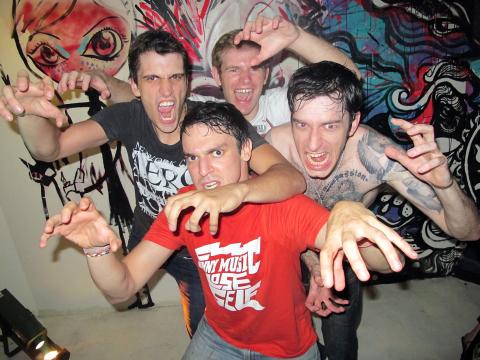Last week Live Wire questioned how Taiwanese youth are affording ticket prices of NT$1,500 to NT$2,500 to see live bands play single shows in Taipei. This week the question is, with 220 bands and 60 DJs over five days at Spring Scream for NT$2,400, how could you afford not to go? That’s less than NT$10 an act!
Of course, money is not the issue when it comes to this veteran of music festivals in Taiwan. Now in it’s 19th year, Spring Scream is more than a chance to see live bands and DJs from around the island, and international acts from America, Canada, France, South Korea, Japan, Hong Kong and Singapore. It’s a once a year opportunity to let your hair down, reunite with friends from all over Taiwan, camp, eat, drink, dance, make art, make out and participate in something that we helped to become what it is.
Every live music fan, artist, musician, writer, and dreamer who supported this festival helped it grow from a handful of bands on a beach into an event that has been up to 10 days long some years and will hit it’s 20th anniversary next year.

Photo: Up Against the Wall
“Come early, stay late, relax, chill out, rock out and try to see as many bands as you can,” said co-founder Wade Davis in a rare interview this week. The sometimes-reticent musician saves the outgoing part of his nature for his friends and his three bands: .22, Aurora, and Dr. Reniculous Lipz and the Skallyunz, leaving press interviews to partner Jimi Moe. “I’m the shy one,” he said.
Davis is excited that the festival falls on a longer holiday this year: “We started because of a four-day-weekend,” he said. “Over the 19 years, some years it’s been only a weekend, but this time we’re having it over five days, so everybody can let go and people don’t have to take time off work — so more bands can come, people can chill out for longer. I hope people can come for the whole thing and just leave the city behind.”
The event will start Wednesday night with a pre-party in the campground where two band stages, a DJ stage, and a Skype-stage called the Bandwidth stage will be set up to pump in live feeds of musicians playing concerts around the world during the festival.

Photo courtesy of band
It will continue with bigger-name bands Thursday to Saturday on four more stages in the main park and will finish with the favorite part for long-timers, the “mellow, eclectic Sunday,” as Davis called it.
I asked him why he thinks the event has been so successful. “Well, Jimi and I became musicians in Taiwan,” he said. “Our passion lies in the music, bands, friends — our lives revolve around music and community, and a passion for the outdoors and a beautiful environment. That combination can’t really go wrong.”
Much of the festival ends up being centered in the campground adjacent to the park, where vendors and artists set up among the campers. “There are great stalls this year,” said Davis. “Great merchandise, good food, good bars — Indian, Mexican, Aboriginal. We support them and they support us by feeding people with interesting food instead of generic night market food.”

Photo: Alita Rickards
In terms of visiting musicians, Davis is particularly excited to see Vialka from France, returning for their fourth year at the festival. “They put on an awesome show,” he said. “They always blow people away.” This year they are bringing an eco-soundman who Davis and Moe will provide with an old car stereo, batteries and solar panels. “He’s got a set up to make a portable sound system and will be able to explain how it’s set up — like a mobile workshop on solar sound systems,” Davis said.
For the sake of brevity I’ll list only my top ten picks, which doesn’t do justice to the full range of bands I intend on running from stage to stage to catch. Post-rock soundscape masters Collider top my agenda, with the rest in no particular order: rock and rollers 88 Guava Seeds 八十八顆芭樂籽), pop-punk-garage group White Eyes (白目), rocker boys Liger Attack, who have a whole new roster of original songs I’m excited to hear, fun bouncy poprock grrrls No Money No Honey, Dr. Reniculous Lipz and the Skallyunz live hip-hop and funk, old-style jug band The Muddy Basin Ramblers, rock-funk-rap from Coach, psychedelic rockers Blind Acid Date, and live electro-dance act Kid Millionaire.
‧Spring Scream (春天吶喊) goes from Wednesday April 3 to Sunday April 7 with music from noon to midnight at Oluanpi Lighthouse National Park (鵝鑾鼻燈塔國家公園). Admission is NT$2,400 at the gate. Tickets can be purchased from 7- Eleven iBon kiosks or Indievox (www.indievox.com). For a full band schedule and links to campgrounds see www.springscream.com.
This weekend has Taichung-based indie band Peaks playing with Blind Acid Date and Kid Millionaire at Revolver’s Ladies Night tomorrow. The latter will be shooting their first music video at the event so get your swag on when you hit the dance floor.
‧Ladies Night at Revolver with Peaks, Blind Acid Date and Kid Millionaire from 10pm tomorrow at Revolver, 1-2 Roosevelt Rd Sec 1, Taipei City (台北市羅斯福路一段1-2號). Admission is free for women, NT$300 for men, includes one drink.
Tomorrow is also Taichung’s annual Whose Travel Charity Book Exchange, with a full day of second-hand books, vendors, food, children’s activities, a silent auction and bands including Two Acres Plowed, Reider Band & Hell Bent Angels, Three Day Bender and the Eversofriendlies.
‧Whose Travel Charity Book Exchange from noon to 9pm tomorrow at Chungming Park (忠明公園), 424 Huamei St, Greater Taichung (台中市華美街424號). Admission is free, minimum donation for books is NT$50 each.
Through the weekend catch the last half of Roxy Rocker’s ROXY 31st Anniversary Music Festival, with 1976 tonight, Mary Bites Kelly (瑪莉咬凱利) and Skaraoke tomorrow, and 88 Guava Seeds on Sunday.
‧Roxy 31st Anniversary Music Festival with bands at 8pm from tonight through Sunday at Roxy Rocker, 177 Heping E Rd Sec 1, Taipei City (台北市和平東路一段177號). Admission is NT$200.

That US assistance was a model for Taiwan’s spectacular development success was early recognized by policymakers and analysts. In a report to the US Congress for the fiscal year 1962, former President John F. Kennedy noted Taiwan’s “rapid economic growth,” was “producing a substantial net gain in living.” Kennedy had a stake in Taiwan’s achievements and the US’ official development assistance (ODA) in general: In September 1961, his entreaty to make the 1960s a “decade of development,” and an accompanying proposal for dedicated legislation to this end, had been formalized by congressional passage of the Foreign Assistance Act. Two

Despite the intense sunshine, we were hardly breaking a sweat as we cruised along the flat, dedicated bike lane, well protected from the heat by a canopy of trees. The electric assist on the bikes likely made a difference, too. Far removed from the bustle and noise of the Taichung traffic, we admired the serene rural scenery, making our way over rivers, alongside rice paddies and through pear orchards. Our route for the day covered two bike paths that connect in Fengyuan District (豐原) and are best done together. The Hou-Feng Bike Path (后豐鐵馬道) runs southward from Houli District (后里) while the

March 31 to April 6 On May 13, 1950, National Taiwan University Hospital otolaryngologist Su You-peng (蘇友鵬) was summoned to the director’s office. He thought someone had complained about him practicing the violin at night, but when he entered the room, he knew something was terribly wrong. He saw several burly men who appeared to be government secret agents, and three other resident doctors: internist Hsu Chiang (許強), dermatologist Hu Pao-chen (胡寶珍) and ophthalmologist Hu Hsin-lin (胡鑫麟). They were handcuffed, herded onto two jeeps and taken to the Secrecy Bureau (保密局) for questioning. Su was still in his doctor’s robes at

Mirror mirror on the wall, what’s the fairest Disney live-action remake of them all? Wait, mirror. Hold on a second. Maybe choosing from the likes of Alice in Wonderland (2010), Mulan (2020) and The Lion King (2019) isn’t such a good idea. Mirror, on second thought, what’s on Netflix? Even the most devoted fans would have to acknowledge that these have not been the most illustrious illustrations of Disney magic. At their best (Pete’s Dragon? Cinderella?) they breathe life into old classics that could use a little updating. At their worst, well, blue Will Smith. Given the rapacious rate of remakes in modern